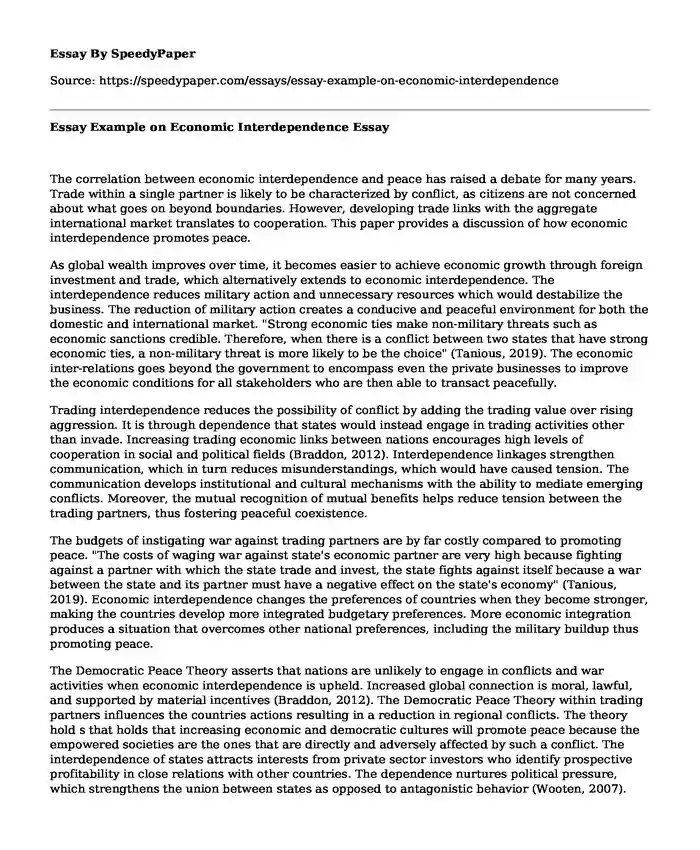
| Type of paper: | Essay |
| Categories: | Economics International relations Democracy |
| Pages: | 3 |
| Wordcount: | 633 words |
The correlation between economic interdependence and peace has raised a debate for many years. Trade within a single partner is likely to be characterized by conflict, as citizens are not concerned about what goes on beyond boundaries. However, developing trade links with the aggregate international market translates to cooperation. This paper provides a discussion of how economic interdependence promotes peace.
As global wealth improves over time, it becomes easier to achieve economic growth through foreign investment and trade, which alternatively extends to economic interdependence. The interdependence reduces military action and unnecessary resources which would destabilize the business. The reduction of military action creates a conducive and peaceful environment for both the domestic and international market. "Strong economic ties make non-military threats such as economic sanctions credible. Therefore, when there is a conflict between two states that have strong economic ties, a non-military threat is more likely to be the choice" (Tanious, 2019). The economic inter-relations goes beyond the government to encompass even the private businesses to improve the economic conditions for all stakeholders who are then able to transact peacefully.
Trading interdependence reduces the possibility of conflict by adding the trading value over rising aggression. It is through dependence that states would instead engage in trading activities other than invade. Increasing trading economic links between nations encourages high levels of cooperation in social and political fields (Braddon, 2012). Interdependence linkages strengthen communication, which in turn reduces misunderstandings, which would have caused tension. The communication develops institutional and cultural mechanisms with the ability to mediate emerging conflicts. Moreover, the mutual recognition of mutual benefits helps reduce tension between the trading partners, thus fostering peaceful coexistence.
The budgets of instigating war against trading partners are by far costly compared to promoting peace. "The costs of waging war against state's economic partner are very high because fighting against a partner with which the state trade and invest, the state fights against itself because a war between the state and its partner must have a negative effect on the state's economy" (Tanious, 2019). Economic interdependence changes the preferences of countries when they become stronger, making the countries develop more integrated budgetary preferences. More economic integration produces a situation that overcomes other national preferences, including the military buildup thus promoting peace.
The Democratic Peace Theory asserts that nations are unlikely to engage in conflicts and war activities when economic interdependence is upheld. Increased global connection is moral, lawful, and supported by material incentives (Braddon, 2012). The Democratic Peace Theory within trading partners influences the countries actions resulting in a reduction in regional conflicts. The theory hold s that holds that increasing economic and democratic cultures will promote peace because the empowered societies are the ones that are directly and adversely affected by such a conflict. The interdependence of states attracts interests from private sector investors who identify prospective profitability in close relations with other countries. The dependence nurtures political pressure, which strengthens the union between states as opposed to antagonistic behavior (Wooten, 2007). The aspiration for international acceptability also motivates nations to promote peace with their trading associates to attract more international links with the realm's most developed countries.
Economic interdependence builds up peace and coexistence in any particular nation. Dependent countries hence need pursue economic links to evade conflicts as economic transactions offers full advantages of close trade connections with no expenditures and risks of hostilities. Economic transactions are more paying than war; therefore, interdependent countries need to focus on trading and avoid invasion.
References
Braddon, D. (2012). The role of economic interdependence in the origins and resolution of conflict. Revue d'economie politique, 122(2), 299-319.
Wooten, A. (2007). Economic interdependence and peace in transitional democracies.
Tanious, M. E. (2019). The impact of economic interdependence on the probability of conflict between states: The case of "American-Chinese relationship on Taiwan since 1995". Review of Economics and Political Science, 4(1), 38-53.
Cite this page
Essay Example on Economic Interdependence. (2023, Jan 23). Retrieved from https://speedypaper.net/essays/essay-example-on-economic-interdependence
Request Removal
If you are the original author of this essay and no longer wish to have it published on the SpeedyPaper website, please click below to request its removal:
- Free Essay on Organizational Change Framework
- The Issues of Cohabitation
- Free Essay Sample: Women's Suffrage Movement and Women's Liberation Movement
- Free Essay Answering How Does Greek Financial Crisis Influence EU Economy Over Time
- Essay Sample: The Lack of Protection of the Victims of Domestic Violence under Asylum Law
- Financial Manager Roles and Responsibilities
- Driving While Texting - Essay Sample
Popular categories




